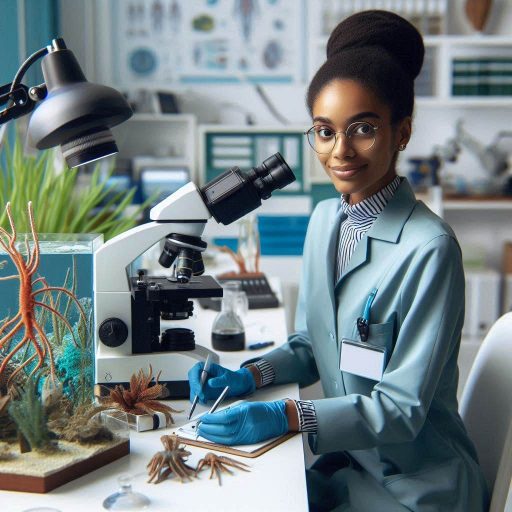Introduction
Marine biology research projects play a vital role in understanding ocean ecosystems.
These projects explore the complexities of marine life and their habitats.
Scientists study various organisms, from tiny plankton to massive whales.
Each project contributes valuable insights into how these species interact and thrive.
Research in marine biology helps address pressing environmental issues.
The oceans face significant challenges due to climate change, pollution, and habitat destruction.
By studying marine biology, researchers can identify the impacts of these threats.
They work to develop effective conservation strategies to protect vulnerable marine species.
The importance of studying marine biology extends beyond environmental concerns.
Marine organisms are crucial for maintaining global biodiversity.
Healthy oceans support diverse ecosystems that provide food, jobs, and recreation.
Marine biology research helps ensure these ecosystems remain balanced and productive.
In addition to ecological benefits, marine biology projects have economic implications.
Fisheries depend on healthy marine populations to sustain their livelihoods.
Understanding fish populations and their behaviors aids in sustainable fishing practices.
This knowledge helps maintain fish stocks for future generations.
Study of Ocean Acidification
Explanation of Ocean Acidification
Ocean acidification refers to the decrease in pH levels of ocean waters.
It occurs due to increased carbon dioxide (CO2) emissions.
When CO2 enters the ocean, it reacts with seawater, forming carbonic acid.
This process reduces the availability of carbonate ions essential for marine organisms.
Coral reefs, mollusks, and shellfish rely on these ions to build their shells and skeletons.
Impact of Ocean Acidification on Marine Life
The impact of ocean acidification on marine life is significant.
Coral reefs suffer from weakened structures, making them vulnerable to environmental stressors.
Studies show that acidification leads to slower growth rates in coral polyps.
Additionally, mollusks such as oysters and clams face challenges in shell formation.
Many fish species experience altered sensory perception and behavior due to acidified waters.
Current Research Projects Addressing Ocean Acidification
Current research projects address the challenges posed by ocean acidification.
Scientists worldwide conduct experiments to understand its effects on different species.
One project in the U.S. focuses on coral reef resilience.
Researchers assess how various coral species adapt to changing pH levels.
They aim to identify which species thrive under acidified conditions.
Another project examines the impact of ocean acidification on commercially important fish species.
Researchers study how changing conditions affect fish growth and reproduction.
They conduct experiments to measure physiological responses in controlled environments.
This research helps inform sustainable fishing practices and management strategies.
In Europe, a project investigates the socio-economic implications of ocean acidification.
It aims to understand how declining shellfish populations affect local economies.
Researchers gather data from fisheries and coastal communities to assess economic impacts.
This project emphasizes the importance of integrating science and policy for effective management.
International collaborations also focus on ocean acidification.
The Global Ocean Acidification Observing Network (GOA-ON) connects researchers worldwide.
It aims to standardize data collection and share information across nations.
This collaborative effort enhances understanding and mitigation strategies for ocean acidification.
Public awareness plays a crucial role in addressing this issue.
Educational initiatives inform communities about the effects of acidification on marine ecosystems.
These programs engage citizens in conservation efforts and advocate for policy changes.
Raising awareness can lead to more support for marine protection initiatives.
In a nutshell, ocean acidification poses a significant threat to marine life.
Ongoing research projects are vital in understanding and mitigating its impacts.
Scientists continue to explore solutions to preserve marine ecosystems for future generations.
Collaborative efforts and public engagement are essential for creating a sustainable future for our oceans.
Read: Profiles in Success: Leading Chemists of the 21st Century in the US
Exploration of Deep-Sea Creatures
Overview of Deep-Sea Ecosystems
Deep-sea ecosystems are among the most fascinating and least understood areas of our planet.
These ecosystems thrive in extreme conditions, with high pressures and low temperatures.
They encompass a diverse array of organisms adapted to survive in darkness and isolation.
Scientists estimate that around 95% of the ocean remains unexplored, particularly in deep-sea environments.
Research Projects Studying Unique Deep-Sea Organisms
Research projects studying unique deep-sea organisms have increased in recent years.
Scientists aim to uncover the mysteries of these remote habitats.
One significant project involves the study of bioluminescent creatures.
These organisms produce light through chemical reactions, helping them communicate and attract prey.
Understanding their biology could provide insights into evolution and adaptation.
Another exciting area of research focuses on giant squid and deep-sea jellyfish.
These creatures are enigmatic and rarely observed in their natural habitat.
Researchers deploy remotely operated vehicles (ROVs) to capture video and samples.
This method allows scientists to study behavior, reproduction, and feeding habits without disturbing their environment.
The exploration of hydrothermal vents is also a key area of research.
These vents release heated, mineral-rich water that supports unique ecosystems.
Organisms like tube worms and extremophiles thrive near these vents.
Scientists investigate their relationships with chemosynthetic bacteria, which convert chemicals into energy.
These studies help researchers understand how life can exist in extreme conditions.
Technologies Used in Deep-Sea Exploration
Technologies used in deep-sea exploration have advanced significantly.
Modern submersibles can dive to great depths, capturing high-resolution images and data.
These vehicles are equipped with sophisticated sensors that measure temperature, pressure, and chemical composition.
Additionally, advanced sonar systems map the ocean floor with remarkable precision.
Scientists also use autonomous underwater vehicles (AUVs) to explore areas too dangerous for human divers.
These unmanned crafts can operate for extended periods, collecting samples and transmitting data in real time.
AUVs help researchers discover new species and assess biodiversity in deep-sea ecosystems.
In addition, DNA barcoding technology allows scientists to identify species from small tissue samples.
This technique provides valuable information about biodiversity and species distribution.
It also aids in tracking changes in marine populations over time.
Deep-sea exploration has revealed astonishing discoveries about marine life.
Many deep-sea organisms possess unique adaptations that could have applications in medicine and technology.
For instance, enzymes from deep-sea bacteria may be useful in industrial processes.
Overall, studying deep-sea ecosystems is vital for understanding our planet’s biodiversity.
These projects not only shed light on unique organisms but also highlight the importance of conservation efforts.
Protecting these fragile environments is crucial for maintaining the health of our oceans.
Read: The Life and Times of a U.S. Physicist: A Day in Detail
Coral Reef Conservation
When it comes to marine biology research projects, one of the critical areas of study is coral reef conservation.
Coral reefs are incredibly important in marine ecosystems, providing habitats for a wide variety of marine life and protecting coastlines from erosion.
Importance of Coral Reefs in Marine Ecosystems
Coral reefs are often referred to as the “rainforests of the sea” due to the incredible biodiversity they support.
They provide food and shelter for countless species of fish, invertebrates, and other marine organisms.
Coral reefs also play a crucial role in protecting coastal areas from storms and erosion.
Threats Facing Coral Reefs
Unfortunately, coral reefs are facing numerous threats that put their survival at risk.
Climate change, ocean acidification, pollution, overfishing, and destructive fishing practices are some of the major factors contributing to the decline of coral reefs worldwide.
As a result, many coral reefs are experiencing bleaching events, where the corals expel the algae living in their tissues, causing them to turn white and ultimately die.
Research Projects Focused on Coral Reef Conservation
Given the urgent need to protect and conserve coral reefs, numerous research projects are underway to better understand these ecosystems and develop strategies to mitigate the threats they face.
Here are some examples of research projects focused on coral reef conservation:
- Coral Bleaching Studies: Researchers are studying the causes and impacts of coral bleaching events to develop interventions that can help corals recover and adapt to changing environmental conditions.
- Coral Restoration Initiatives: Some research projects are focused on developing techniques for coral reef restoration, such as coral farming and transplantation, to help damaged reefs recover and thrive.
- Impact of Climate Change: Scientists are investigating how climate change is affecting coral reef ecosystems, including rising sea temperatures and ocean acidification, to inform conservation efforts and policy decisions.
- Community Engagement: Many research projects involve working closely with local communities to raise awareness about the importance of coral reefs and involve them in conservation efforts to ensure long-term sustainability.
- Marine Protected Areas: Establishing marine protected areas (MPAs) is a key strategy for coral reef conservation, and researchers are studying the effectiveness of different MPA designs and management practices in preserving coral reef ecosystems.
Overall, coral reef conservation is a critical area of research in marine biology, and the work being done in this field is essential for protecting these valuable ecosystems for future generations.
Read: Salary Ranges: What to Expect as a Physicist in the USA
Marine Mammal Behavior Studies
Importance of Understanding Marine Mammal Behavior
Understanding marine mammal behavior is crucial for their conservation and management.
These creatures play significant roles in marine ecosystems.
Studying their behavior helps scientists identify their needs and challenges.
Marine mammals, including whales, dolphins, and seals, exhibit complex social structures.
By observing these behaviors, researchers can assess the health of marine environments.
Research Projects Tracking and Studying Marine Mammals
Several research projects focus on tracking and studying marine mammals.
For instance, scientists use satellite tags to monitor migration patterns.
These tags provide real-time data on their movements and behaviors.
Researchers have discovered migration routes that were previously unknown.
Such information is vital for developing effective conservation strategies.
Another prominent study involves analyzing vocalizations among dolphins.
By using hydrophones, scientists record their sounds in various environments.
These vocalizations play a crucial role in social interactions.
Understanding communication patterns enhances our knowledge of their social structures.
Researchers have also documented specific calls related to foraging and navigation.
This knowledge aids in interpreting how dolphins adapt to their surroundings.
Moreover, researchers study the impact of human activities on marine mammals.
For example, shipping traffic often disrupts their communication and migratory patterns.
Studies have shown that increased noise pollution can lead to stress in marine mammals.
Understanding these effects allows scientists to advocate for measures that reduce disturbances.
One significant project examines the behavior of humpback whales during breeding season.
Researchers use drones to observe their interactions from above.
This approach minimizes human impact while providing valuable data.
Observations reveal intricate mating behaviors and social hierarchies.
Such insights are essential for understanding their reproductive success.
Additionally, studies on seal behavior help scientists understand their foraging strategies.
Researchers tag seals to monitor their diving patterns and prey selection.
This information reveals how environmental changes affect their feeding habits.
Changes in prey availability can impact seal populations and marine ecosystems.
Insights Gained from Studying Marine Mammal Behavior
Insights gained from studying marine mammal behavior also inform policy decisions.
Data collected from these studies contribute to marine conservation initiatives.
Policymakers rely on scientific evidence to establish protected areas.
Understanding behaviors helps designate critical habitats essential for survival.
Furthermore, public awareness of marine mammal behavior increases support for conservation efforts.
Engaging communities in research fosters a sense of stewardship.
People become more invested in protecting marine ecosystems when they understand the importance of these creatures.
In fact, marine mammal behavior studies are vital for their conservation and management.
They provide insights into complex interactions within marine ecosystems.
Ongoing research helps mitigate human impacts, ensuring these species thrive for generations to come.
Understanding these behaviors ultimately supports a healthier ocean environment.
Read: Physics Specializations: Choosing Your Path in the U.S.

Impact of Climate Change on Marine Life
Climate change is a pressing issue that is affecting marine life in various ways.
Transform Your Career Today
Unlock a personalized career strategy that drives real results. Get tailored advice and a roadmap designed just for you.
Start NowEffects of climate change on marine ecosystems
One of the major impacts of climate change on marine ecosystems is ocean acidification.
Increased carbon dioxide levels in the atmosphere are causing the ocean to absorb more CO2, leading to acidic seawater.
This acidic environment is harmful to marine life, especially shell-building organisms like corals and mollusks.
Rising sea temperatures are another consequence of climate change that is affecting marine ecosystems.
Warmer waters can disrupt the balance of marine ecosystems, causing shifts in species composition and distribution.
This can lead to the decline of certain species and the proliferation of others, disrupting the overall biodiversity of marine habitats.
Research projects studying climate change impacts
Scientists are conducting research projects to better understand the impacts of climate change on marine life.
One such project is the Global Ocean Observing System, which aims to monitor and study ocean conditions to track changes in temperature, acidity, and other factors that affect marine ecosystems.
Another research project, the Coral Reef Watch, focuses on studying the effects of climate change on coral reefs.
By monitoring temperature trends and coral bleaching events, researchers can assess the health of coral reefs and develop strategies to protect them from the impacts of climate change.
Strategies for mitigating climate change effects on marine life
In order to mitigate the effects of climate change on marine life, conservation efforts are crucial.
One strategy is the establishment of marine protected areas, which can help preserve critical habitats and prevent overfishing and other harmful activities that can further stress marine ecosystems.
Reducing carbon emissions and transitioning to renewable energy sources are also important strategies for mitigating the impacts of climate change on marine life.
By reducing the amount of carbon dioxide in the atmosphere, we can slow down ocean acidification and temperature rise, providing some relief to marine ecosystems.
Ultimately, addressing the impacts of climate change on marine life requires a comprehensive approach that involves scientific research, conservation efforts, and policy changes.
By working together to protect marine ecosystems, we can help ensure the health and vitality of our oceans for future generations.
Marine Pollution Research
Marine pollution represents a significant threat to ocean ecosystems.
Various types of pollution impact marine environments, including plastic waste, oil spills, and chemical runoff.
Each type of pollution poses unique challenges to marine life and habitats.
Types of Marine Pollution
Plastic pollution is one of the most pervasive issues.
Millions of tons of plastic enter oceans annually, harming wildlife.
Marine animals often ingest plastic, mistaking it for food.
This ingestion can lead to starvation, malnutrition, and even death.
Moreover, microplastics have infiltrated the food chain, affecting smaller organisms and ultimately humans.
Oil spills are another critical form of marine pollution.
They occur due to tanker accidents or offshore drilling.
Oil coats marine surfaces, harming the animals that rely on them.
Sea birds, for instance, suffer severe damage when their feathers become coated in oil.
This oil disrupts their ability to fly and maintain body temperature.
Chemical runoff also poses serious risks.
Agricultural and industrial activities often lead to hazardous chemicals entering waterways.
These pollutants can create dead zones, where oxygen levels drop significantly.
Marine organisms cannot survive in these low-oxygen areas, leading to declines in biodiversity.
Effects of Pollution on Marine Organisms
Research projects are essential for understanding and combating marine pollution.
Scientists worldwide study the impacts of pollution on marine organisms.
They investigate how pollutants affect reproduction, growth, and survival rates.
Their findings help develop strategies to mitigate pollution’s effects.
One significant project is the Ocean Cleanup initiative.
This project aims to remove plastic from ocean gyres, focusing on the Great Pacific Garbage Patch.
Researchers employ advanced technology to collect and recycle plastic waste.
Their goal is to reduce the overall amount of plastic in the ocean significantly.
Another important research effort is focused on oil spill recovery.
Scientists develop bioremediation techniques that use microorganisms to degrade oil.
These techniques enhance the natural processes that clean up spills, speeding recovery and restoring habitats.
Furthermore, many institutions study the effects of nutrient runoff on marine ecosystems.
They analyze how excess nutrients lead to harmful algal blooms.
These blooms can produce toxins that harm marine life and humans.
Research findings inform policies aimed at reducing nutrient runoff from agricultural lands.
Research Projects Aiming to Reduce Marine Pollution
In essence, marine pollution remains a pressing challenge for ocean health.
Various types of pollution, including plastics, oil, and chemicals, threaten marine organisms.
Ongoing research projects aim to understand these impacts and develop effective solutions.
By supporting these initiatives, we can work toward cleaner oceans and healthier marine ecosystems.
See Related Content: Conferences and Events for Nuclear Scientists
Delve into the Subject: Role of Forensic Odontology in Investigations
Gain More Insights: Top Astronomy Conferences and Events to Attend
Genetics and Evolution in Marine Species
Importance of studying genetics in marine organisms
Studying genetics in marine organisms helps scientists understand their evolutionary history and adaptations.
Genetic studies can reveal the relationships between different species and how they have evolved over time.
By analyzing genetic information, researchers can uncover genetic diversity within populations and identify unique traits.
Understanding the genetic makeup of marine species can provide insight into their resilience to environmental changes.
Research projects investigating evolution in marine species
One research project focuses on studying the genetic basis of color variation in coral reef fish.
Another project examines how genetic mutations contribute to the adaptation of marine mammals to the aquatic environment.
Researchers are also investigating how genetic diversity influences the distribution and abundance of marine species.
A study is underway to explore how genetic changes in response to climate change impact the evolution of marine organisms.
Showcase Your Business Today
Reach thousands of readers actively exploring professional services. Publish your business profile and grow your audience now.
Publish NowImplications of genetic research for marine conservation
Genetic research can help identify vulnerable populations of marine species that are at risk of extinction.
Understanding genetic diversity can inform conservation efforts and help prioritize areas for protection.
By studying the genetics of invasive species, scientists can develop strategies to mitigate their impacts on marine ecosystems.
Genetic research can also aid in the restoration of damaged marine habitats by identifying genetically diverse populations for reintroduction.
Essentially, genetics and evolution play a crucial role in marine biology research, providing valuable insights for conservation efforts and understanding the adaptation of marine species to changing environments.
Aquaculture and Sustainable Fisheries
Importance of Sustainable Fisheries Management
Sustainable fisheries management plays a crucial role in preserving marine ecosystems.
Overfishing threatens fish populations and disrupts aquatic biodiversity.
Implementing sustainable practices ensures fish stocks remain healthy and abundant.
These practices involve careful monitoring of fish populations and habitat protection.
They also promote responsible fishing techniques that minimize environmental impact.
Research Projects Focused on Aquaculture and Fisheries Sustainability
Research projects focused on aquaculture and fisheries sustainability have gained momentum in recent years.
Scientists and researchers aim to develop methods that enhance fish production without harming ecosystems.
They explore alternative feeds that reduce reliance on wild-caught fish.
This approach helps protect marine resources and promotes biodiversity.
Innovations in Aquaculture Practices
Innovations in aquaculture practices contribute to sustainability efforts.
Recirculating aquaculture systems (RAS) have emerged as a popular solution.
RAS minimizes water usage while maximizing fish production.
It allows farmers to raise fish in controlled environments, reducing the need for antibiotics and chemicals.
This system also decreases waste discharge into surrounding waters.
Another promising innovation is integrated multi-trophic aquaculture (IMTA).
This method combines different species, allowing for a more balanced ecosystem.
For example, seaweed and shellfish can filter water, improving the environment for fish.
IMTA not only increases overall productivity but also enhances nutrient cycling.
Researchers are also focusing on breeding programs to create resilient fish strains.
These strains can better withstand environmental changes and diseases.
Selective breeding enhances growth rates and reduces mortality, leading to more sustainable fish farming practices.
Sustainable fisheries management emphasizes the importance of community involvement.
Engaging local fishermen in decision-making processes fosters a sense of ownership.
This involvement leads to more responsible fishing practices and better compliance with regulations.
Education and outreach programs can help raise awareness about the benefits of sustainable fisheries.
Several organizations are conducting research projects to address sustainability in fisheries.
The Food and Agriculture Organization (FAO) focuses on global initiatives to improve fishery management.
Their projects aim to develop guidelines for sustainable fishing practices.
Similarly, various universities and research institutions conduct studies on aquaculture innovations.
These studies explore the economic, social, and environmental aspects of sustainable fisheries.
Collaboration between scientists, policymakers, and industry stakeholders is vital.
Together, they can develop and implement effective management strategies.
This collaboration can ensure that both aquaculture and wild fisheries thrive for future generations.
Overall, sustainable fisheries management is essential for protecting marine ecosystems.
Ongoing research and innovations in aquaculture practices pave the way for a more sustainable future.
By prioritizing sustainability, we can ensure that fish populations remain healthy and accessible for years to come.
Conclusion
Marine biology research projects are crucial for understanding our oceans and their ecosystems.
These initiatives help scientists uncover the complexities of marine life.
They also reveal how human activities impact ocean health.
By studying marine organisms, researchers can identify patterns and trends essential for conservation efforts.
The knowledge gained from marine biology research informs sustainable practices.
It helps shape policies that protect marine environments and resources.
For example, research on coral reefs reveals their vital role in marine biodiversity.
Protecting these ecosystems supports countless species and enhances resilience against climate change.
Marine biology research also addresses pressing issues like overfishing and pollution.
Understanding these problems can lead to innovative solutions that benefit both marine life and human communities.
Furthermore, research initiatives promote public awareness of the importance of ocean conservation.
They inspire people to take action and become advocates for marine protection.
Investing in marine biology research is essential for future generations.
It ensures that we have the knowledge needed to preserve our oceans.
We must prioritize funding for research initiatives that explore ocean health and marine ecosystems.
Government agencies, private organizations, and individuals can all contribute to these efforts.
Supporting marine research initiatives is not just a scientific concern; it is a moral obligation.
Our oceans provide vital resources, including food, medicine, and climate regulation.
By promoting research, we safeguard these resources for future generations.
Moreover, collaboration among scientists, policymakers, and the public enhances the effectiveness of marine research projects.
[E-Books for Sale]
The Big Book of 500 High-Paying Jobs in America: Unlock Your Earning Potential
$19.99 • 500 High-Paying Jobs • 330 pages
Explore 500 high-paying jobs in America and learn how to boost your career, earn more, and achieve success!
See All 500 High-Paying Jobs of this E-Book
1001 Professions Without a Degree: High-Paying American Jobs You Can Start Now
$19.99 • 1001 Professions Without a Degree • 174 pages
Discover 1001 high-paying jobs without a degree! Unlock career tips, skills, and success strategies for just $19.99!




